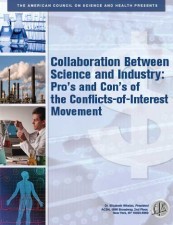 For about a century, industry has played an important role in creating new technology and funding scientific research.
For about a century, industry has played an important role in creating new technology and funding scientific research. For about a century, industry has played an important role in creating new technology and funding scientific research.
For about a century, industry has played an important role in creating new technology and funding scientific research.
Recently, though, the collaboration between science and industry has been threatened by the development of a movement that proposes to end or drastically limit such cooperation on the grounds that it involves unacceptable conflicts of interest.
The idea that science should be pure and untainted by any potential conflicts of interest may seem appealing in theory, but its application in the real world has hidden pitfalls.
In this report, which is based on a detailed American Council on Science and Health white paper by Ronald Bailey, science correspondent for Reason magazine, the conflicts-of-interest movement is examined, with an emphasis on the following topics:
The scientific evidence on whether industry ties are actually leading to biased decisions, threats to patient safety, and distorted research results;
The bias that may be created by focusing exclusively on industry-related financial conflicts of interest, while ignoring other types of potentially conflicting interests;
The mechanisms currently in place to protect the integrity of scientific research; and, most importantly
The very real harm that can result from limiting industry/university collaborations and preventing industry-connected scientists from serving on government advisory boards. Collaboration Between Science and Industry: Pro's and Con's of the Conflicts-of-Interest Movement


